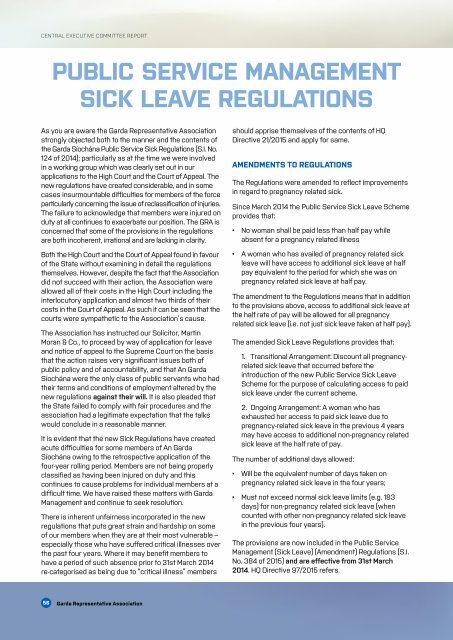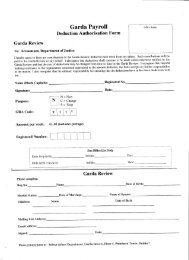Conference Report 2016
Table of contents contains links on page 5. It can be used to skip through chapters.
Table of contents contains links on page 5. It can be used to skip through chapters.
You also want an ePaper? Increase the reach of your titles
YUMPU automatically turns print PDFs into web optimized ePapers that Google loves.
CENTRAL EXECUTIVE COMMITTEE REPORT<br />
PublIC SERVICE mANAGEmENT<br />
SICK lEAVE REGulATIONS<br />
As you are aware the Garda Representative Association<br />
strongly objected both to the manner and the contents of<br />
the Garda Síochána Public Service Sick Regulations (S.I. No.<br />
124 of 2014); particularly as at the time we were involved<br />
in a working group which was clearly set out in our<br />
applications to the High Court and the Court of Appeal. The<br />
new regulations have created considerable, and in some<br />
cases insurmountable difficulties for members of the force<br />
particularly concerning the issue of reclassification of injuries.<br />
The failure to acknowledge that members were injured on<br />
duty at all continues to exacerbate our position. The GRA is<br />
concerned that some of the provisions in the regulations<br />
are both incoherent, irrational and are lacking in clarity.<br />
Both the High Court and the Court of Appeal found in favour<br />
of the State without examining in detail the regulations<br />
themselves. However, despite the fact that the Association<br />
did not succeed with their action, the Association were<br />
allowed all of their costs in the High Court including the<br />
interlocutory application and almost two thirds of their<br />
costs in the Court of Appeal. As such it can be seen that the<br />
courts were sympathetic to the Association’s cause.<br />
The Association has instructed our Solicitor, Martin<br />
Moran & Co., to proceed by way of application for leave<br />
and notice of appeal to the Supreme Court on the basis<br />
that the action raises very significant issues both of<br />
public policy and of accountability, and that An Garda<br />
Síochána were the only class of public servants who had<br />
their terms and conditions of employment altered by the<br />
new regulations against their will. It is also pleaded that<br />
the State failed to comply with fair procedures and the<br />
association had a legitimate expectation that the talks<br />
would conclude in a reasonable manner.<br />
It is evident that the new Sick Regulations have created<br />
acute difficulties for some members of An Garda<br />
Síochána owing to the retrospective application of the<br />
four-year rolling period. Members are not being properly<br />
classified as having been injured on duty and this<br />
continues to cause problems for individual members at a<br />
difficult time. We have raised these matters with Garda<br />
Management and continue to seek resolution.<br />
There is inherent unfairness incorporated in the new<br />
regulations that puts great strain and hardship on some<br />
of our members when they are at their most vulnerable –<br />
especially those who have suffered critical illnesses over<br />
the past four years. Where it may benefit members to<br />
have a period of such absence prior to 31st March 2014<br />
re-categorised as being due to “critical illness” members<br />
should apprise themselves of the contents of HQ<br />
Directive 21/2015 and apply for same.<br />
AmENDmENTS TO REGulATIONS<br />
The Regulations were amended to reflect improvements<br />
in regard to pregnancy related sick.<br />
Since March 2014 the Public Service Sick Leave Scheme<br />
provides that:<br />
• No woman shall be paid less than half pay while<br />
absent for a pregnancy related illness<br />
• A woman who has availed of pregnancy related sick<br />
leave will have access to additional sick leave at half<br />
pay equivalent to the period for which she was on<br />
pregnancy related sick leave at half pay.<br />
The amendment to the Regulations means that in addition<br />
to the provisions above, access to additional sick leave at<br />
the half rate of pay will be allowed for all pregnancy<br />
related sick leave (i.e. not just sick leave taken at half pay).<br />
The amended Sick Leave Regulations provides that:<br />
1. Transitional Arrangement: Discount all pregnancyrelated<br />
sick leave that occurred before the<br />
introduction of the new Public Service Sick Leave<br />
Scheme for the purpose of calculating access to paid<br />
sick leave under the current scheme.<br />
2. Ongoing Arrangement: A woman who has<br />
exhausted her access to paid sick leave due to<br />
pregnancy-related sick leave in the previous 4 years<br />
may have access to additional non-pregnancy related<br />
sick leave at the half rate of pay.<br />
The number of additional days allowed:<br />
• Will be the equivalent number of days taken on<br />
pregnancy related sick leave in the four years;<br />
• Must not exceed normal sick leave limits (e.g. 183<br />
days) for non-pregnancy related sick leave (when<br />
counted with other non-pregnancy related sick leave<br />
in the previous four years).<br />
The provisions are now included in the Public Service<br />
Management (Sick Leave) (Amendment) Regulations (S.I.<br />
No. 384 of 2015) and are effective from 31st March<br />
2014. HQ Directive 97/2015 refers.<br />
5<br />
Garda Representative Association




